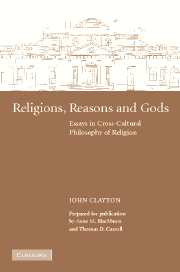Book contents
- Frontmatter
- Contents
- Editorial preface
- Acknowledgments
- List of abbreviations
- 1 Claims, contexts and contestability
- PART I REASON AND RELIGIOUS PLURALISM
- PART II THEISTIC ARGUMENTS IN PRE-MODERN CONTEXTS
- PART III THEISTIC ARGUMENTS IN EARLY-MODERN CONTEXTS
- 8 The debate about God in early-modern French philosophy
- 9 The Enlightenment project and the debate about God in early-modern German philosophy
- 10 The debate about God in early-modern British philosophy
- 11 Beyond the ‘Enlightenment project’?
- Appendix: The 1997 Hulsean Sermon
- Bibliography
- Index
11 - Beyond the ‘Enlightenment project’?
Published online by Cambridge University Press: 22 September 2009
- Frontmatter
- Contents
- Editorial preface
- Acknowledgments
- List of abbreviations
- 1 Claims, contexts and contestability
- PART I REASON AND RELIGIOUS PLURALISM
- PART II THEISTIC ARGUMENTS IN PRE-MODERN CONTEXTS
- PART III THEISTIC ARGUMENTS IN EARLY-MODERN CONTEXTS
- 8 The debate about God in early-modern French philosophy
- 9 The Enlightenment project and the debate about God in early-modern German philosophy
- 10 The debate about God in early-modern British philosophy
- 11 Beyond the ‘Enlightenment project’?
- Appendix: The 1997 Hulsean Sermon
- Bibliography
- Index
Summary
PROLOGUE: PUBLIC AND PRIVATE IN THE JEFFERSONIAN PROJECT
The American Thomas Jefferson, whom we met in the opening lecture of this series, remarked once in passing in a letter to John Adams (8 April 1816) that unbelief or infidelity in Catholic countries expressed itself as atheism, but in Protestant countries, as theism. That is in fact not far off what we found in the previous lecture, ‘Of Ancients and Moderns’, which detailed the rise of atheism in France and the fading of design in Britain.
Jefferson himself never lost confidence in the design argument, holding that, if one viewed the universe ‘in its parts general or particular … it is impossible … for the human mind not to believe that there is, in all this, design …’. As I noted at the time, Jefferson did not seem acquainted with Hume's critique of design, although he did know some of Hume's writings; but he seems not to have known any of Kant's writings, although Immanuel Kant did know those of the author of the Declaration of Independence and the Founder of the University of Virginia.
Earlier, I used Jefferson to exemplify the European Enlightenment, not least in regard to his sharp division between natural religion's right of access to public space and sectarian religion's confinement to the private realm, a division critical to the success of the Enlightenment enterprise, ensuring both the rationality of the public and the toleration of the private.
- Type
- Chapter
- Information
- Religions, Reasons and GodsEssays in Cross-cultural Philosophy of Religion, pp. 292 - 309Publisher: Cambridge University PressPrint publication year: 2006



